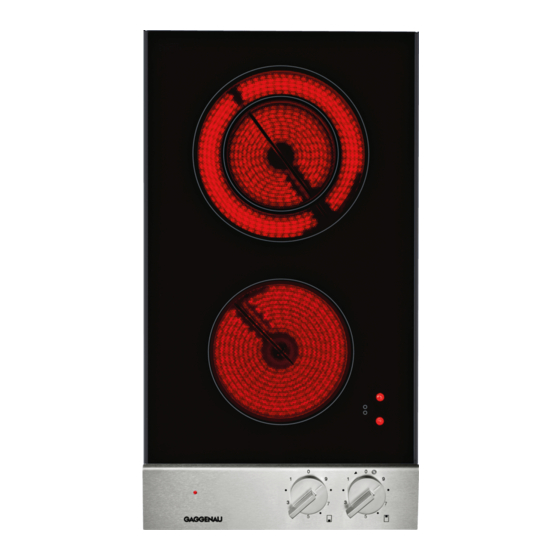Gaggenau VE 260 Kullanım Kılavuzları - Sayfa 14
Setüstü Ocak Gaggenau VE 260 için çevrimiçi göz atın veya pdf Kullanım Kılavuzları indirin. Gaggenau VE 260 16 sayfaları. Glass ceramic cooktop

Operation
The markings on the control knobs show the position of the
corresponding cooking zone and the heat setting.
Switching on
Turn the corresponding control knob to the left or right to the
required cooking level. The indicator light goes on, when a
cooking zone is switched on.
Notes
‒
Cooking zones featuring combination: the control knob
can only be turned to the left to switch on the cooking
zone.
‒
The cooking zones are regulated by switching the
heating elements on and off. This is normal. The heating
elements remain at full power and are switched on
and off in longer or shorter intervals, depending on the
setting.
–
Even on the highest cooking level the heating elements
will be switched on and off. This is normal.
Switching off
Turn the control knob to 0 to switch off the cooking zone.
The residual heat display remains on as long as the cooking
zone is too hot to be touched safely.
Note: Cooking zones featuring combination: the control
knob cannot be turned directly from the combination position
to the left to 0.
Cooking zone combination
Only for cooking zones featuring combination: the size
of the cooking zone can be extended using cooking zone
combination.
To activate the combination, turn the control knob to the left
beyond 9 to the combination symbol and then back to the
required cooking level.
Turn the control knob to 0 to switch off the cooking zone.
When switching the cooking zone on again, the combination
has to be activated again if required.
Note: The control knob cannot be turned directly from the
combination position to the left to 0.
14
Residual heat indicator
For your safety the hob features individual residual heat
indicators. A red signal lights up for each cooking zone.
The residual heat display indicates that, after switching off, a
cooking zone has still not cooled down to such an extent that
it can be safely touched.
Settings table
Setting
Cooking method
9
Boiling
Searing
Heating
Boiling
Blanching
8 - 6
Roasting
7 - 5
Browning
Roasting
Baking
Boiling in open pot Liquids
6 - 5
Frying
Reducing
5 - 4
Simmering
Simmering in open
pot
5 - 3
Boiling with closed
lid
Steaming
Stewing
Braising
Thawing
3 - 1
Slow cooking
Reheating,
keeping warm
Melting
Setting
Switch to the highest cooking level in order to reach the
required temperature quickly. Then always switch back to the
lower cooking level.
The cooking levels are identical for all cooking zones.
The values given above must be looked upon as
recommended values. The heat required depends not only
on the type and condition of the food, but also the size and
contents of the pot.
Examples
Water
Meat
Fat, liquids
Soups, sauces
Vegetables
Meat, fish, potatoes
Flour, onions
Almonds, breadcrumbs
Pancakes, egg dishes
Bacon
Stocks, sauces
Crèmes, sauces
Dumplings, sausages,
soup garnish, meat stock,
poached eggs
Pasta, soups, sauces
Vegetables, potatoes, fish
Vegetables, fruit, fish
Goulash, rolled beef
steaks, roasts, vegetables
Frozen foods
Rice, pulses
Soups, casserole,
vegetables in a sauce
Butter, choccolate
Egg dishes
